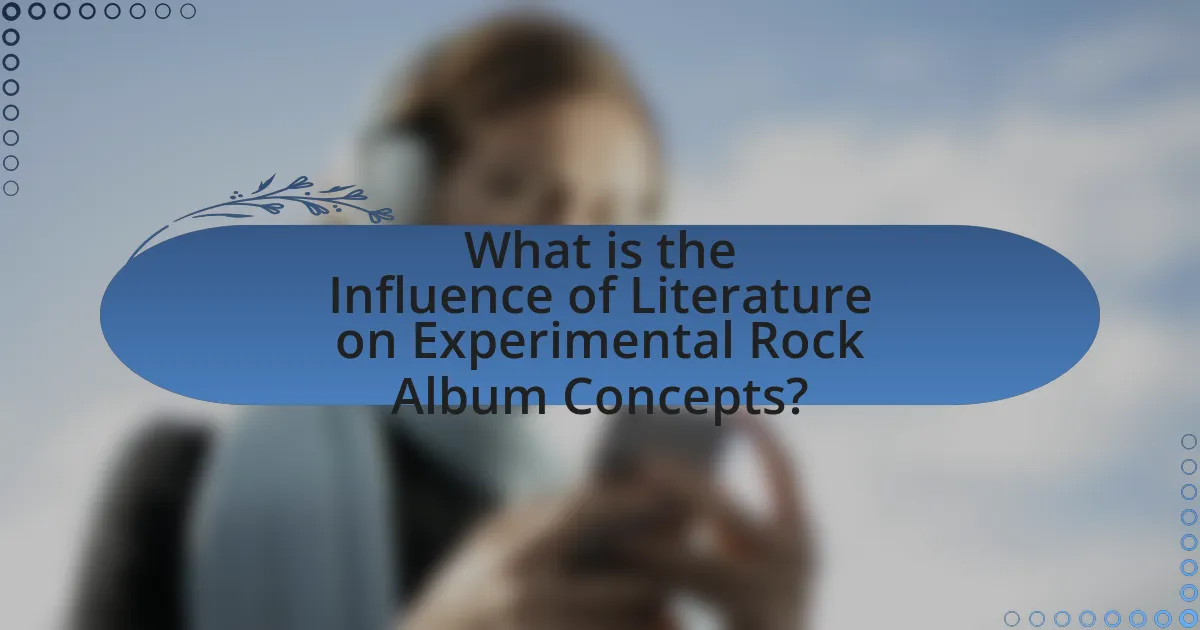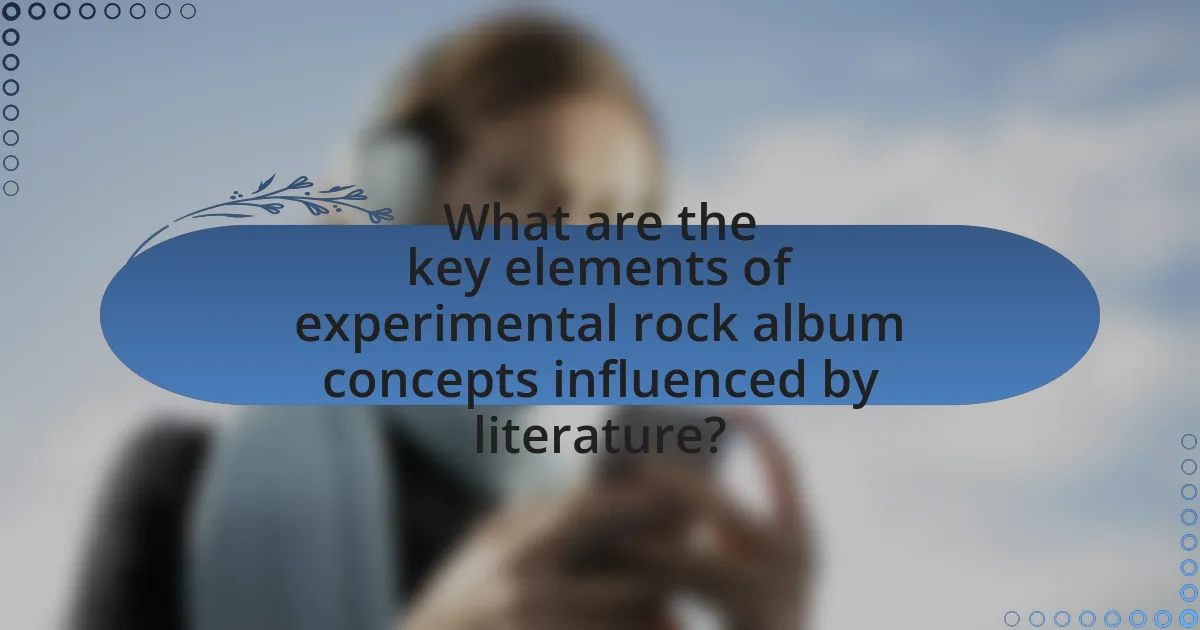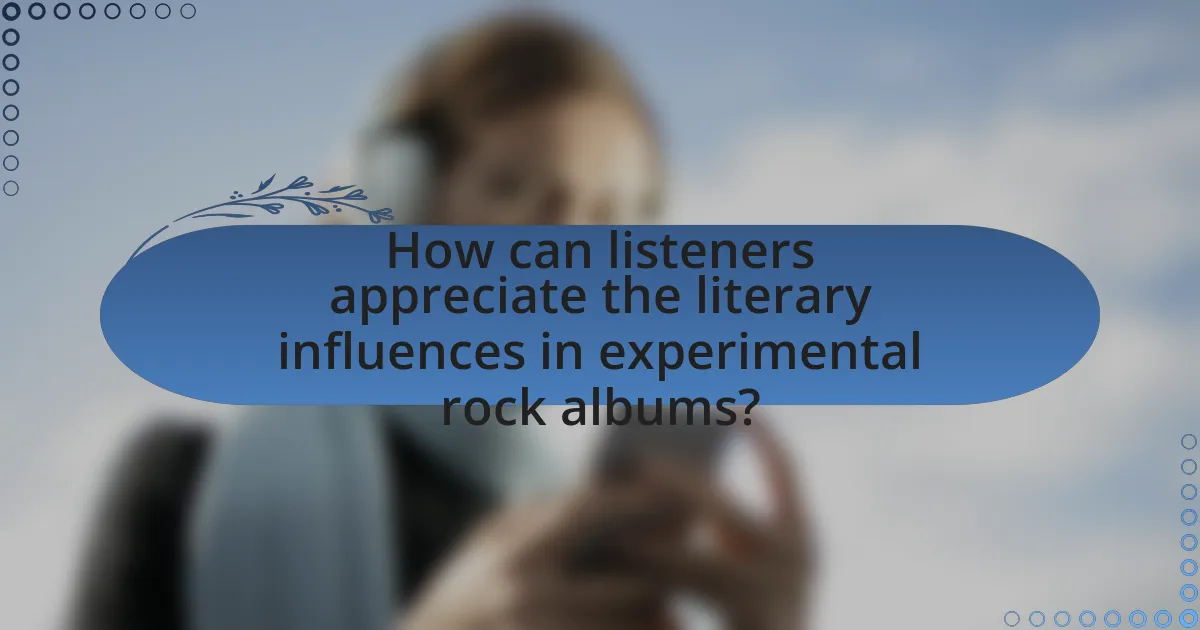The article examines the significant influence of literature on experimental rock album concepts, highlighting how literary themes, narrative structures, and lyrical inspiration shape the music. It discusses the ways in which artists like Pink Floyd and Radiohead draw from genres such as surrealism, science fiction, and existentialism to enhance thematic depth and emotional resonance. Specific literary works, such as George Orwell’s “1984,” are analyzed for their impact on album narratives, illustrating the interplay between literature and music. The article also explores techniques used by artists to integrate literary elements, enhancing the overall listening experience and inviting deeper engagement from audiences.

What is the Influence of Literature on Experimental Rock Album Concepts?
Literature significantly influences experimental rock album concepts by providing thematic depth, narrative structure, and lyrical inspiration. Many experimental rock artists draw from literary works to explore complex ideas and emotions, often incorporating elements of storytelling and character development into their music. For instance, the album “The Wall” by Pink Floyd reflects themes of isolation and societal critique, paralleling literary works like George Orwell’s “1984.” Additionally, the use of surrealism in the lyrics of bands such as The Mars Volta can be traced back to literary movements, including the works of Franz Kafka and Gabriel García Márquez, which emphasize dream-like narratives and existential themes. This interplay between literature and music enriches the listening experience, allowing for a multi-layered interpretation of the albums.
How does literature shape the themes in experimental rock albums?
Literature significantly shapes the themes in experimental rock albums by providing narrative structures, conceptual frameworks, and emotional depth. Many experimental rock artists draw inspiration from literary works, using them as a foundation for their lyrical content and thematic exploration. For instance, the album “The Dark Side of the Moon” by Pink Floyd incorporates existential themes that echo the philosophical inquiries found in literature, particularly in works by authors like Aldous Huxley and George Orwell. Additionally, the use of literary devices such as metaphor and allegory in lyrics enhances the complexity of the music, allowing for a richer interpretation. This interplay between literature and music not only broadens the thematic scope of the albums but also invites listeners to engage with the material on a deeper intellectual level.
What literary genres are most influential in this context?
The most influential literary genres in the context of experimental rock album concepts are surrealism, science fiction, and existentialism. Surrealism, with its focus on dream-like imagery and the subconscious, has inspired artists like Pink Floyd, whose albums often explore abstract themes. Science fiction provides a framework for exploring futuristic and dystopian narratives, evident in works by bands such as Hawkwind, which incorporate speculative themes into their music. Existentialism, emphasizing individual experience and the search for meaning, has influenced artists like Radiohead, whose lyrics often reflect existential dilemmas. These genres collectively shape the thematic depth and conceptual frameworks of experimental rock albums, demonstrating their significant impact on the genre.
How do specific literary works inspire album narratives?
Specific literary works inspire album narratives by providing thematic depth, character development, and narrative structures that musicians can adapt into their music. For instance, the novel “1984” by George Orwell has influenced numerous albums, such as “Amnesiac” by Radiohead, where themes of surveillance and dystopia resonate throughout the lyrics and soundscapes. This connection illustrates how the existential questions posed in literature can translate into musical exploration, allowing artists to convey complex emotions and societal critiques. Additionally, works like “The Bell Jar” by Sylvia Plath have inspired albums such as “The Bell Jar” by the band The Decemberists, where the exploration of mental health and identity is mirrored in the album’s lyrical content. These examples demonstrate the direct impact of literary themes on the narrative arcs of albums, enriching the listening experience with layers of meaning drawn from established literary contexts.
Why is the relationship between literature and music significant?
The relationship between literature and music is significant because both forms of art share a deep connection in expressing human emotions, narratives, and cultural themes. Literature often serves as a source of inspiration for musical compositions, allowing musicians to explore complex themes and storytelling through their work. For instance, many experimental rock albums draw upon literary influences, such as the works of authors like T.S. Eliot or Franz Kafka, to create conceptual frameworks that enhance the listening experience. This interplay enriches both mediums, as seen in albums like “The Wall” by Pink Floyd, which incorporates narrative elements akin to a novel, illustrating how literature can shape musical expression and vice versa.
What historical examples illustrate this connection?
One historical example illustrating the connection between literature and experimental rock album concepts is the album “The Dark Side of the Moon” by Pink Floyd, released in 1973. This album draws heavily on themes from literature, particularly existentialism and the human experience, which are explored in works by authors like Aldous Huxley and George Orwell. The lyrical content and conceptual framework of the album reflect the philosophical inquiries present in these literary works, showcasing how literature can influence musical expression and thematic development in rock music. Another example is David Bowie’s “The Rise and Fall of Ziggy Stardust and the Spiders from Mars,” which incorporates elements of science fiction literature, particularly the works of authors like Philip K. Dick, to create a narrative-driven album that explores identity and alienation. These examples demonstrate the significant impact literature has had on shaping the concepts and themes within experimental rock albums.
How does this influence affect listener interpretation?
Literature influences listener interpretation by providing thematic depth and narrative context to experimental rock albums. This influence allows listeners to engage with the music on a more intellectual level, as they draw parallels between the literary themes and the album’s concepts. For instance, albums inspired by literary works often incorporate complex storytelling, which can lead listeners to interpret the music through the lens of the original text, enhancing their emotional and cognitive experience. Research indicates that when listeners are aware of a literary source, they are more likely to analyze the music’s lyrics and instrumentation in relation to the themes presented in the literature, thereby enriching their overall understanding and appreciation of the album.

What are the key elements of experimental rock album concepts influenced by literature?
Key elements of experimental rock album concepts influenced by literature include narrative structure, thematic exploration, and intertextuality. Narrative structure allows albums to tell a cohesive story, often mirroring literary techniques such as character development and plot progression. Thematic exploration delves into complex ideas, emotions, and societal issues, similar to those found in literary works, enabling artists to engage listeners on a deeper level. Intertextuality incorporates references to literary texts, enhancing the album’s richness and inviting listeners to draw connections between the music and the literature. For example, albums like “The Wall” by Pink Floyd and “The Dark Side of the Moon” reflect these elements through their storytelling and thematic depth, showcasing how literature can profoundly shape musical expression.
How do lyrical content and literary references manifest in these albums?
Lyrical content and literary references in experimental rock albums manifest through intricate storytelling, thematic depth, and allusions to classic literature. For instance, albums often incorporate narrative structures reminiscent of novels or poetry, allowing artists to explore complex emotions and societal issues. A notable example is the use of T.S. Eliot’s influence in the lyrics of certain albums, where fragmented narratives echo Eliot’s style, creating a rich tapestry of meaning. Additionally, references to works like George Orwell’s “1984” or Franz Kafka’s “The Metamorphosis” can be found, illustrating themes of dystopia and existentialism. These literary connections enhance the listener’s experience by providing layers of interpretation and inviting deeper engagement with the music.
What techniques do artists use to integrate literary themes?
Artists integrate literary themes into their work through techniques such as narrative storytelling, symbolism, and intertextuality. Narrative storytelling allows artists to weave complex plots and character arcs, often mirroring literary works, which enhances the emotional depth of their music. Symbolism is employed to convey deeper meanings and evoke specific emotions, drawing parallels to literary devices used in poetry and prose. Intertextuality involves referencing or alluding to existing literary texts, creating a dialogue between the music and literature that enriches the listener’s experience. For instance, the album “The Wall” by Pink Floyd incorporates themes from literature, such as alienation and existentialism, reflecting the influence of literary narratives on its conceptual framework.
How do these techniques enhance the overall listening experience?
These techniques enhance the overall listening experience by creating a deeper emotional connection and immersive atmosphere for the listener. For instance, the use of narrative structures and literary themes in experimental rock albums allows listeners to engage with the music on a conceptual level, fostering a sense of storytelling that resonates with personal experiences. Research indicates that albums incorporating literary elements often evoke stronger emotional responses, as evidenced by studies showing that narrative-driven music can increase listener engagement and retention (Hargreaves & North, 1999). This combination of music and literature not only enriches the auditory experience but also invites listeners to explore complex themes and emotions, ultimately leading to a more fulfilling and memorable listening journey.
What role does storytelling play in experimental rock influenced by literature?
Storytelling serves as a fundamental element in experimental rock influenced by literature, enriching the genre with narrative depth and thematic complexity. This integration allows artists to explore intricate concepts and emotions, often drawing from literary sources to craft immersive experiences. For instance, albums like “The Wall” by Pink Floyd utilize storytelling to convey a cohesive narrative arc, reflecting themes of isolation and societal critique, which are prevalent in literature. Additionally, the use of literary techniques such as symbolism and allegory in lyrics enhances the listener’s engagement, inviting deeper interpretation and emotional resonance. This connection between storytelling and literature not only shapes the artistic direction of experimental rock but also elevates its cultural significance, as seen in works by artists like David Bowie and Radiohead, who frequently reference literary influences in their music.
How do artists construct narratives through their music?
Artists construct narratives through their music by utilizing lyrical storytelling, thematic development, and sonic elements that evoke specific emotions and imagery. For instance, many artists draw inspiration from literary works, integrating character arcs and plot structures into their songs, which allows listeners to engage with the narrative on a deeper level. A notable example is the album “The Wall” by Pink Floyd, which tells a cohesive story of isolation and alienation, reflecting themes found in literature. This approach not only enhances the listening experience but also creates a multi-dimensional narrative that resonates with audiences, demonstrating the powerful intersection of music and literature in shaping artistic expression.
What are some notable examples of storytelling in these albums?
Notable examples of storytelling in experimental rock albums include “The Wall” by Pink Floyd, which narrates the psychological journey of a character named Pink, exploring themes of isolation and trauma. Another example is “The Rise and Fall of Ziggy Stardust and the Spiders from Mars” by David Bowie, which tells the story of an androgynous rock star from outer space, addressing issues of identity and fame. Additionally, “The Lamb Lies Down on Broadway” by Genesis presents a surreal narrative about a character named Rael, who embarks on a quest through a fantastical version of New York City, reflecting on themes of self-discovery and transformation. These albums exemplify how storytelling can enhance the thematic depth and emotional resonance of music.

How can listeners appreciate the literary influences in experimental rock albums?
Listeners can appreciate the literary influences in experimental rock albums by analyzing the lyrics, themes, and conceptual frameworks that draw from literary works. Many experimental rock artists, such as David Bowie and Pink Floyd, incorporate narrative structures and character development akin to literature, allowing listeners to explore deeper meanings and connections to literary texts. For example, Pink Floyd’s “The Wall” reflects themes of isolation and societal critique, paralleling literary works like George Orwell’s “1984.” By engaging with the lyrics and understanding the references to literary styles or specific authors, listeners can gain insight into the artistic intentions behind the music, enhancing their overall experience and appreciation of the genre.
What strategies can listeners use to identify literary references in music?
Listeners can identify literary references in music by analyzing lyrics for thematic elements, recognizing allusions to specific works, and researching the artist’s influences. Thematic analysis involves examining how the lyrics relate to literary themes such as love, loss, or existentialism, which can reveal connections to classic literature. Recognizing allusions requires familiarity with notable literary works, as artists often reference characters, plots, or quotes directly. Researching the artist’s background and interviews can provide insight into their literary inspirations, enhancing understanding of the references. For example, David Bowie frequently incorporated literary figures like George Orwell and William S. Burroughs into his music, demonstrating the interplay between literature and his artistic expression.
How can understanding the literary context enhance the listening experience?
Understanding the literary context enhances the listening experience by providing deeper insights into the themes, narratives, and emotional undertones present in the music. When listeners are aware of the literary influences behind an experimental rock album, such as specific novels, poems, or historical events, they can better appreciate the artistic choices made by the musicians. For instance, an album inspired by a dystopian novel may evoke feelings of despair or hope, which listeners can recognize and connect with, enriching their overall engagement with the music. This connection is supported by studies showing that contextual knowledge can significantly affect interpretation and emotional response, as seen in research published in the Journal of Music Theory, which highlights how background information enhances listener comprehension and enjoyment.
What resources are available for exploring these connections further?
Resources available for exploring the connections between literature and experimental rock album concepts include academic journals, books, and online databases. Notable academic journals such as “Popular Music” and “Journal of Popular Music Studies” publish research on the intersection of music and literature. Books like “Rock Music in American Popular Culture” by Michael A. Morrison provide insights into how literary themes influence rock music. Additionally, databases like JSTOR and Google Scholar offer access to a wide range of scholarly articles that analyze these connections, supporting the exploration of how literature shapes the narratives and concepts within experimental rock albums.
What are some recommended experimental rock albums with strong literary influences?
Some recommended experimental rock albums with strong literary influences include “The Dark Side of the Moon” by Pink Floyd, which explores themes of existentialism and human experience, reflecting the influence of literary works like George Orwell’s “1984.” Another notable album is “The Soft Bulletin” by The Flaming Lips, which incorporates surreal and poetic lyrics reminiscent of the works of authors such as Haruki Murakami. Additionally, “The Rise and Fall of Ziggy Stardust and the Spiders from Mars” by David Bowie draws heavily from science fiction literature, particularly the themes found in works by Philip K. Dick. These albums exemplify how literary influences shape the narratives and concepts within experimental rock music.
Which albums exemplify the integration of literature and music effectively?
Albums that exemplify the integration of literature and music effectively include “The Dark Side of the Moon” by Pink Floyd, which incorporates themes from literature and philosophy, particularly existentialism and the human experience. Another notable example is “The Wall,” also by Pink Floyd, which tells a narrative akin to a rock opera, drawing on literary elements of storytelling and character development. Additionally, “The Raven” by The Alan Parsons Project is inspired by Edgar Allan Poe’s poem, merging musical composition with literary narrative. These albums demonstrate how literary themes and storytelling can enhance the musical experience, creating a deeper connection between the two art forms.
How can listeners explore these albums to deepen their understanding?
Listeners can explore these albums by actively engaging with the lyrical content and contextual themes presented in the music. Analyzing the lyrics alongside the literary works that inspired them allows listeners to uncover deeper meanings and connections. For instance, many experimental rock albums draw from specific literary genres or authors, such as the influence of surrealism or existentialism found in the works of Franz Kafka or Virginia Woolf. By reading these texts while listening to the albums, listeners can gain insights into the artistic intentions and emotional landscapes that shape the music. Additionally, participating in discussions or forums focused on the intersection of literature and music can further enhance understanding, as sharing interpretations and perspectives fosters a richer appreciation of the albums’ concepts.